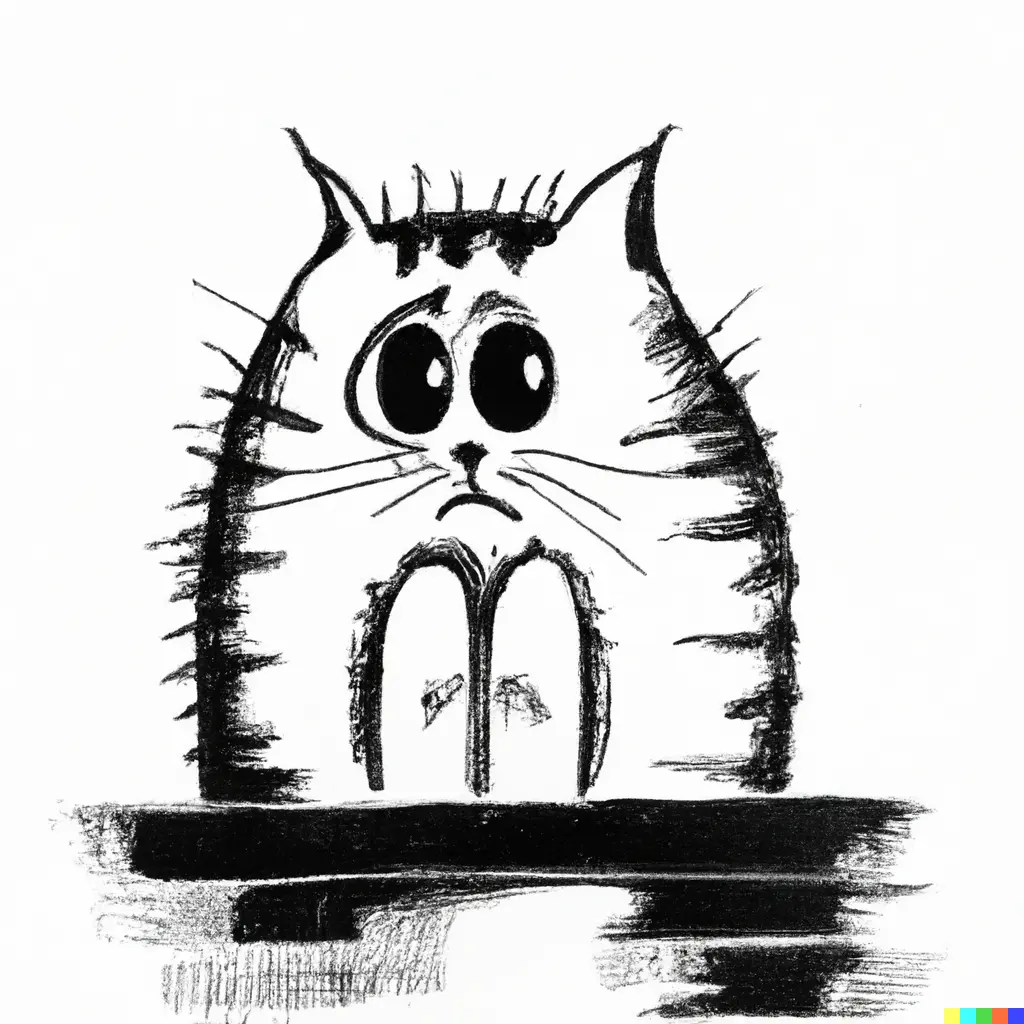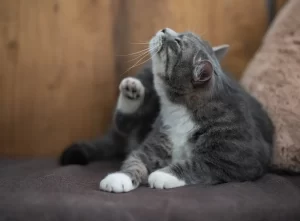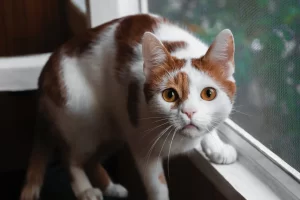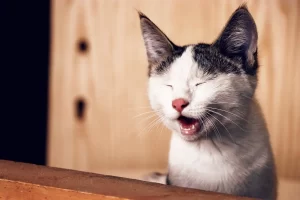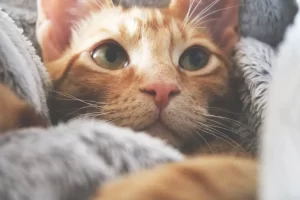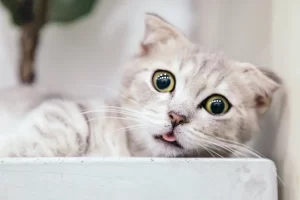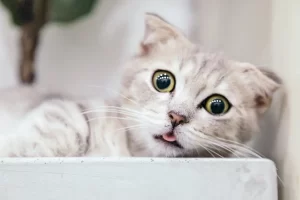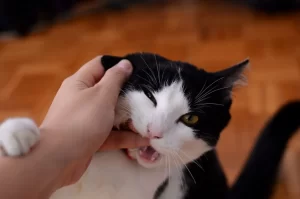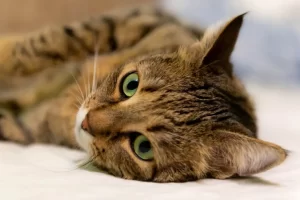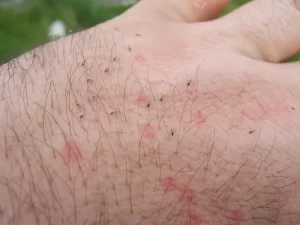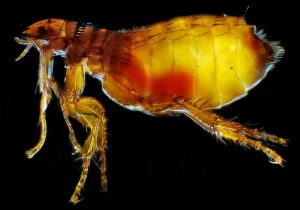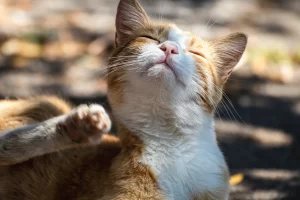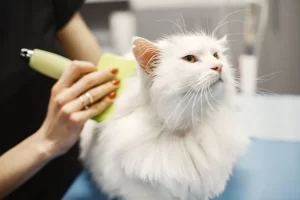Cat anxiety is a common issue faced by many pet owners, and it can be distressing for both the cat and the owner. While conventional treatments, such as medication and over-the-counter medicines, are available, some pet owners prefer to explore natural remedies for their feline friends. Natural remedies for cat anxiety can include essential oils, aromatherapy, herbal remedies, pheromones, diet and nutrition, exercise and play, environmental enrichment, and many more. These remedies offer a gentler and more holistic approach to treating cat anxiety, and they can be an effective way to reduce stress and improve the overall well-being of cats. In this article, we will explore the various natural remedies for cat anxiety and their benefits, so you can make an informed decision about the best approach for your furry friend.
Table of Contents
ToggleDefinition of cat anxiety
Cat anxiety is a common behavioral issue among domesticated cats. It refers to the manifestation of fear, stress, or nervousness in response to certain stimuli or situations. This type of anxiety can present in various forms, such as separation anxiety, fear of loud noises, or general anxiety, and can result in a range of physical and behavioral symptoms in affected cats. The causes of cat anxiety can vary but can include changes in the cat’s environment, lack of socialization, or underlying medical conditions. Addressing cat anxiety is important for the health and well-being of the cat and can involve a combination of conventional treatments, such as medication or behavior modification, and natural remedies, such as pheromones and essential oils.
Causes of cat anxiety in cats
The causes of cat anxiety in cats can include:
- Environmental changes: Moving to a new home, changes in family structure, the introduction of new pets, or changes in the daily routine can cause stress and anxiety in cats.
- Lack of socialization: Cats that are not exposed to different people, places, and experiences during their critical socialization period (2-7 weeks of age) may be more prone to anxiety later in life.
- Underlying medical conditions: Chronic pain, hearing loss, or other medical issues can contribute to anxiety in cats.
- Fear or trauma: Traumatic events such as abuse, abandonment, or a traumatic event can cause long-term anxiety in cats.
- Genetics: Some cats may be predisposed to anxiety due to their breed or family history.
- Sensory processing issues: Cats with sensory processing disorders, such as feline hyperesthesia syndrome, may experience heightened anxiety levels.
- Lack of proper exercise and play: Cats require physical and mental stimulation to stay healthy and happy, and a lack of these activities can lead to anxiety.
- Improper diet and nutrition: A diet lacking essential nutrients and imbalanced in carbohydrates and protein can lead to anxiety in cats.
- Confinement and isolation: Cats are social animals and need interaction and stimulation. Confinement or isolation for long periods of time can cause anxiety in cats.
Signs and symptoms of cat anxiety in cats
The signs and symptoms of cat anxiety in cats can include:
- Urination and defecation outside of the litter box: This can be a sign of stress or fear.
- Excessive grooming: Cats may lick themselves excessively as a way of coping with anxiety.
- Hiding or seeking attention: Cats may hide or become clingy when they are anxious.
- Destructive behavior: Cats may scratch furniture, curtains, or other household items when they are feeling anxious.
- Decreased appetite: Anxiety can cause a decrease in appetite and weight loss in cats.
- Vocalization: Cats may meow excessively or make other vocalizations when they are feeling anxious.
- Aggression: Cats may become aggressive towards people or other pets when they are feeling anxious.
- Tremors or shivering: Cats may shake or shiver when they are feeling anxious.
- Rapid breathing or panting: Anxiety can cause increased heart rate and rapid breathing in cats.
- Dilated pupils: The pupils may become enlarged in response to anxiety.
- Decreased activity level: Cats may become less active or lethargic when they are feeling anxious. Try these home treatments to boost their energy and elevate their activity level.
It’s important to note that some of these symptoms can also be related to other health issues, so it is best to consult with a veterinarian to determine the underlying cause of any changes in behavior.
Importance of early identification and treatment of cat anxiety
Early identification and treatment of cat anxiety are important for several reasons:
- Improves quality of life: Treating cat anxiety can improve the overall quality of life for affected cats, reducing or eliminating symptoms and allowing them to live more happily and comfortably.
- Prevents behavioral issues: Left untreated, cat anxiety can lead to destructive behavior, such as scratching furniture or excessive vocalization. Early treatment can prevent or reduce these behaviors.
- Maintains physical health: Chronic anxiety can lead to health problems in cats, such as decreased appetite and weight loss. Early treatment can help maintain the cat’s physical health.
- Strengthens the bond between cat and owner: When a cat’s anxiety is treated, the cat may become more affectionate and interactive with its owner, strengthening the bond between them.
- Cost-effective: Early treatment of cat anxiety can be less costly and less time-consuming than addressing the issue after it has become chronic.
- Reduces stress for the owner: When a cat’s anxiety is treated, the owner’s stress levels can decrease, as they are no longer witnessing their pet’s suffering and behavioral issues.
Medication and over-the-counter medicines
Conventional treatments for cat anxiety include medication, prescription medicines, and over-the-counter (OTC) remedies:
Medication:
- Anti-anxiety drugs (such as benzodiazepines or selective serotonin reuptake inhibitors (SSRIs)) can be prescribed by a veterinarian to help manage symptoms of anxiety.
- Antidepressants may also be prescribed to help manage symptoms of anxiety.
Benefits and instructions: Medications can provide quick relief for symptoms of anxiety and can be effective for severe cases of anxiety. Medications for cat anxiety should only be used under the direction of a veterinarian. The veterinarian will determine the correct dosage and frequency of administration based on the individual cat’s needs.
Prescription medicines:
- Pheromone diffusers (such as Feliway) emit a synthetic pheromone that mimics the natural calming pheromones produced by cats.
- Adaptil, a pheromone diffuser, can help reduce stress and anxiety in cats.
Benefits and instructions: Prescription medicines can help reduce symptoms of anxiety in cats and are easy to use. Prescription medicines should be used according to the manufacturer’s instructions and with the guidance of a veterinarian.
Over-the-counter remedies:
- Herbal remedies (such as valerian root, chamomile, or passion flower) may be used to help manage symptoms of anxiety in cats.
- Nutritional supplements (such as B-complex vitamins or L-theanine) may also be used to help manage symptoms of anxiety in cats.
Benefits and instructions: Over-the-counter remedies are generally safe and can be an effective complementary treatment for cat anxiety. Over-the-counter remedies should be used according to the manufacturer’s instructions and with the guidance of a veterinarian. It’s important to note that not all OTC remedies have been scientifically tested for safety and efficacy in cats.
Natural remedies for cat anxiety
Natural remedies for cat anxiety include:
- Environmental enrichment: Providing a comfortable and safe environment, including toys, scratching posts, and hiding places, stimulates the cat’s mind and body and provides a sense of security.
- Pheromone therapy: Using synthetic calming pheromones (such as Feliway or Adaptil) to mimic natural pheromones and help reduce anxiety.
- Herbal remedies: Administer herbal remedies (such as valerian root, chamomile, or passion flower) to help manage symptoms of anxiety.
- Nutritional supplements: Adding nutritional supplements (such as B-complex vitamins or L-theanine) to the cat’s diet to help manage symptoms of anxiety.
- Aromatherapy: Using essential oils (such as lavender or catnip) to create a calming environment and reduce anxiety.
- Behavioral modification: Working with a veterinarian or animal behaviorist to implement positive reinforcement training and behavioral modification techniques to address the root cause of anxiety.
Natural remedies should be used according to the manufacturer’s instructions and with the guidance of a veterinarian. It’s important to note that not all natural remedies have been scientifically tested for safety and efficacy in cats.
Essential oils for treating cat anxiety
Essential oils for treating cat anxiety include:
- Lavender oil: Known for its calming and relaxing properties, lavender oil can help reduce anxiety in cats.
Benefits and instructions: Lavender oil can help create a calming environment and reduce symptoms of anxiety in cats. Lavender oil should be diluted before being used on cats. It can be added to a diffuser, sprinkled on a cloth, or added to the cat’s bedding. It’s important to note that not all essential oils are safe for cats, and it’s best to consult a veterinarian before using any essential oil on a cat.
- Valerian oil: Valerian oil has been used for centuries to treat anxiety and promote relaxation.
Benefits and instructions: Valerian oil can help calm nervous cats and reduce symptoms of anxiety. Valerian oil should be diluted before being used on cats. It can be added to a diffuser, sprinkled on a cloth, or added to the cat’s bedding.
- Chamomile oil: Chamomile oil has a calming effect and can help reduce anxiety in cats.
Benefits and instructions: Chamomile oil can help create a calming environment and reduce symptoms of anxiety in cats. Chamomile oil should be diluted before being used on cats. It can be added to a diffuser, sprinkled on a cloth, or added to the cat’s bedding.
- Catnip oil: Catnip oil is a natural stimulant that can help reduce anxiety in cats.
Benefits and instructions: Catnip oil can help create a calming environment and reduce symptoms of anxiety in cats. Catnip oil should be diluted before being used on cats. It can be added to a diffuser, sprinkled on a cloth, or added to the cat’s bedding.
It’s important to note that not all essential oils are safe for cats, and it’s best to consult a veterinarian before using any essential oil on a cat. Additionally, some cats may have a negative reaction to certain essential oils, so it’s important to monitor the cat’s behaviour and adjust the use of essential oils accordingly.
Herbal remedies for treating cat anxiety
Herbal remedies for treating cat anxiety include:
- Chamomile: A natural calming herb that can help reduce anxiety in cats by creating a calming environment and reducing symptoms of anxiety. Can be given as a tea, added to food/water, or sprinkled on bedding.
- Valerian root: Has been used for centuries to treat anxiety and promote relaxation. Can be given as a tea, added to food/water, or sprinkled on bedding.
- Catnip: A natural stimulant that can help reduce anxiety in cats by creating a calming environment and reducing symptoms of anxiety. Can be given as a tea, added to food/water, or sprinkled on bedding.
- Passionflower: A herb that can help reduce anxiety and promote relaxation. Can be given as a tea or extract.
- Skullcap: A herb that can help reduce anxiety and promote relaxation. Can be given as a tea or extract.
- St. John’s Wort: A herb that can help reduce anxiety and improve mood. Can be given as a tea or extract.
- Lavender: A herb with a calming scent that can help reduce anxiety. Can be used in a diffuser, sprinkled on bedding, or added to a bath.
- Kava: A herb from the South Pacific that can help reduce anxiety. Can be given as a tea or extract.
- Bacopa: An herb commonly used in Ayurvedic medicine that can help reduce anxiety. Can be given as a tea or extract.
It’s important to note that not all herbs are safe for cats and it’s best to consult a veterinarian before using any herbal remedy on a cat.
Pheromones for treating cat anxiety
Pheromones for treating cat anxiety include:
- Feliway: A synthetic pheromone that mimics the natural comforting pheromones cats release. Can be used in a diffuser, spray, or wipe form.
- Comfort Zone: A synthetic pheromone that mimics the natural comforting pheromones cats release. Can be used in a diffuser form.
- DAP (Dog Appeasing Pheromone): A synthetic pheromone that mimics the natural comforting pheromones mother dogs release to calm their puppies. Can be used in a diffuser form.
- ThunderEase: A synthetic pheromone that mimics the natural calming pheromones cats release. Can be used in a diffuser form.
- Adaptil: A synthetic pheromone that mimics the natural comforting pheromones dogs release. Can be used in a diffuser form.
- SENTRY Calming Pheromone Collar: A pheromone collar that releases a synthetic calming pheromone to help reduce anxiety in cats. Can be worn on the cat’s neck.
These pheromones can help create a calming environment and reduce symptoms of anxiety in cats. It’s important to follow the manufacturer’s instructions and use pheromones consistently for the best results.
Diets, nutrition, and supplements for reducing cat anxiety
Diet, nutrition, and supplements for reducing cat anxiety can include:
- Diet: Providing a balanced diet with proper nutrition can help maintain overall health and reduce anxiety in cats. Offer high-quality, species-appropriate food and consider switching to a grain-free diet if necessary.
- Supplements: Some supplements can help reduce anxiety in cats, including omega-3 fatty acids, L-Theanine, and B-complex vitamins.
- Essential fatty acids (omega-3s): Can be found in fish oils, such as salmon or sardines, and can help reduce inflammation and promote a healthy nervous system.
- L-Theanine: An amino acid found in green tea that can promote relaxation and reduce anxiety. Can be found in supplement form.
- B-complex vitamins: Can help reduce stress and promote a healthy nervous system. Can be found in supplement form.
It’s important to consult a veterinarian before starting any new supplement regimen for a cat with anxiety. Dosage, frequency, and safety information may vary based on the individual cat.
Exercise and play for reducing cat anxiety
Exercise and play are essential for reducing cat anxiety and promoting overall health. Here are ways to incorporate exercise and play into a cat’s daily routine:
- Interactive toys: Provide toys that challenge the cat mentally, like puzzle feeders and fishing-pole-style toys.
- Play sessions: Dedicate time for play sessions using toys to encourage physical activity.
- Scratching posts: Offer scratching posts to fulfill a cat’s natural instincts and relieve anxiety.
- Climbing structures: Provide climbing structures for the cat to explore and reduce anxiety.
- Environmental enrichment: Add new and interesting elements to the cat’s environment, such as hiding spots and perches, to increase mental stimulation.
- Outdoor access: If it’s safe and possible, allow outdoor access for the cat to explore and engage in natural predatory behaviors.
- Adapt to the cat’s needs: Tailor exercise and play to the cat’s preferences, some may enjoy more physical activity while others may prefer mental stimulation through play.
Environmental enrichment for reducing cat anxiety
Environmental enrichment can help reduce anxiety in cats by providing stimulation and satisfying natural instincts. Here are ways to incorporate environmental enrichment into a cat’s daily routine:
- Hiding spots: Offer hiding spots for the cat to retreat to when feeling anxious.
- Scratching posts: Provide scratching posts to fulfill a cat’s natural scratching instincts and relieve anxiety.
- Perches: Offer perches for the cat to observe its environment from a higher perspective and reduce anxiety.
- Bird feeders: Incorporate bird feeders into the environment to provide mental stimulation and entertainment for the cat.
- New toys and objects: Introduce new toys and objects into the environment to promote exploration and reduce anxiety.
- Change the environment: Vary the environment regularly by rearranging furniture, adding new elements, and removing others.
- Outdoor access: If safe and feasible, provide outdoor access for the cat to explore and engage in natural predatory behaviors.
It’s important to consult with a veterinarian to determine the best plan for environmental enrichment for a cat with anxiety.

Socialization and interaction with other cats
Socialization and interaction with other cats can help reduce anxiety in cats. Here are ways to encourage socialization and interaction:
- Introducing new cats: Gradually introduce new cats to each other to reduce stress and increase socialization.
- Playtime with other cats: Encourage playtime between cats, either supervised or with toys, to increase socialization.
- Group play sessions: Offer group play sessions with other cats to increase socialization and reduce anxiety.
- Multi-cat households: Consider having multiple cats in the same household, as they can provide each other with comfort and social stimulation.
- Cat cafes or parks: Take the cat to cat cafes or parks where they can interact with other cats and reduce anxiety.
It’s important to consult with a veterinarian to determine the best plan for socialization and interaction with other cats for a cat with anxiety.
Training and behavior modification for reducing cat anxiety
Training and behavior modification can help reduce anxiety in cats. Here are ways to incorporate training and behavior modification:
- Positive reinforcement training: Use positive reinforcement techniques, such as treats or praise, to reinforce desired behaviors and reduce anxiety.
- Counter-conditioning: Change a cat’s negative associations with certain stimuli or environments through positive reinforcement training.
- Desensitization: Gradually expose the cat to a feared stimulus in a controlled and safe environment to reduce anxiety.
- Relaxation training: Teach the cat relaxation techniques, such as deep breathing or progressive muscle relaxation, to reduce anxiety.
- Environmental enrichment: Incorporate environmental enrichment, such as hiding spots or perches, to reduce anxiety and promote positive behavior.
Consult with a veterinarian or a professional animal behaviorist to determine the best plan for training and behavior modification for a cat with anxiety.
The use of music and sound therapy for cat anxiety
Music and sound therapy can help reduce anxiety in cats. Here are ways to incorporate music and sound therapy:
- Calming music: Play soft, soothing music for the cat to help reduce anxiety and promote relaxation.
- Nature sounds: Play sounds of nature, such as the sound of rain or birds singing, to reduce anxiety and promote relaxation.
- White noise: Play white noise, such as the sound of a fan or a white noise machine, to reduce anxiety and promote relaxation.
- Pheromone-infused music: Play music infused with calming pheromones to help reduce anxiety.
- Customized sound therapy: Work with a professional to create a customized sound therapy plan specifically for the cat’s individual needs and preferences.
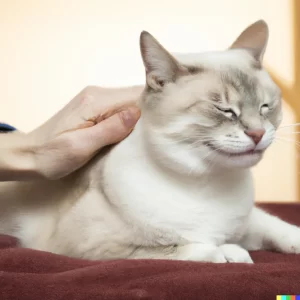
Massage therapy for reducing cat anxiety
Massage therapy can help reduce anxiety in cats. Here are ways to incorporate massage therapy:
- Gentle petting: Gently pet the cat in a calm and soothing manner to promote relaxation and reduce anxiety.
- Cat massage: Use gentle, slow strokes to massage the cat, focusing on areas that the cat enjoys being touched.
- Aromatherapy massage: Incorporate essential oils or calming scents into the massage to promote relaxation and reduce anxiety.
- Professional massage therapy: Work with a professional animal massage therapist to create a customized massage therapy plan specifically for the cat’s individual needs and health.
- Acupressure: Use acupressure techniques, such as applying gentle pressure to specific points on the cat’s body, to promote relaxation and reduce anxiety.
Acupuncture for treating cat anxiety
Acupuncture is a traditional Chinese medicine technique that involves the insertion of fine needles into specific points on the body to promote healing and reduce anxiety. Here are some ways acupuncture can help reduce cat anxiety:
- Stimulating nerve endings: Acupuncture can stimulate nerve endings, promoting relaxation and reducing anxiety.
- Improving circulation: Acupuncture can improve circulation, which can help reduce anxiety and promote overall well-being.
- Regulating the nervous system: Acupuncture can regulate the nervous system, helping to reduce anxiety and promote relaxation.
- Balancing energy: Acupuncture can balance energy, helping to reduce anxiety and promote overall well-being.
- Reducing stress hormones: Acupuncture can reduce stress hormones, helping to reduce anxiety.
Consideration of underlying medical conditions contributing to anxiety
Underlying medical conditions can contribute to anxiety in cats and should be considered when evaluating and treating anxiety. Some common medical conditions that can cause or exacerbate anxiety in cats include:
- Thyroid problems: Thyroid problems can cause anxiety in cats, as well as a range of other symptoms.
- Pain: Chronic pain can cause anxiety in cats and should be addressed.
- Cognitive decline: Cognitive decline can cause confusion and anxiety in older cats.
- Sensory decline: A decline in vision or hearing can cause anxiety in cats.
- Gastrointestinal issues: Gastrointestinal issues such as irritable bowel syndrome can cause anxiety in cats.
It’s important to have a thorough medical evaluation performed by a veterinarian to rule out any underlying medical conditions that may be contributing to a cat’s anxiety. Read more on How often do you take a cat to the vet?
Understanding the side effects of natural remedies for cat anxiety
It’s important to understand the potential side effects of natural remedies for cat anxiety, as some remedies can have adverse effects. Some common side effects of natural remedies for cat anxiety in cats include:
- Allergic reactions: Cats can have allergic reactions to certain essential oils, herbs, or other natural remedies, which can result in skin irritation, itching, or even anaphylaxis.
- Toxicity: Some natural remedies can be toxic to cats if used in large amounts or if the cat ingests them.
- Interactions with other medications: Some natural remedies can interact with other medications that a cat is taking, leading to adverse effects.
- Ineffectiveness: Some natural remedies may not be effective for all cats or may not work as well as expected.
- Over-stimulation: Some natural remedies can cause over-stimulation in cats, leading to increased anxiety or restlessness.
It’s important to always consult with a veterinarian before using any natural remedies for cat anxiety and to monitor the cat for any adverse effects.
Does cat anxiety depend on the cat’s bread, age, or gender?
Yes, cat anxiety can depend on various factors, including breed, age, and gender.
- Breed: Certain cat breeds, such as Siamese and Bengal cats, may be more prone to anxiety due to their highly active and energetic nature.
- Age: Cats of different ages can experience anxiety differently. Kittens and senior cats may be more prone to anxiety due to changes in their environment or health.
- Gender: Some studies suggest that female cats may be more prone to anxiety than male cats, although more research is needed to confirm this.
It’s important to note that these factors can interact and that each cat is unique, so the effects of breed, age, and gender on cat anxiety can vary.

